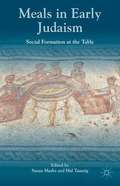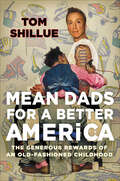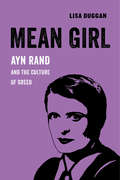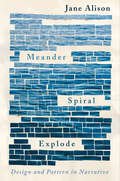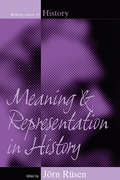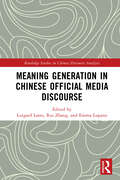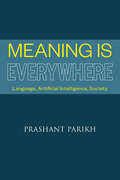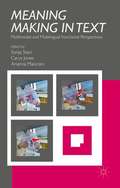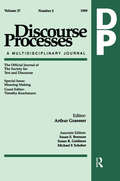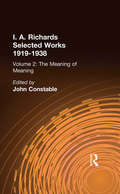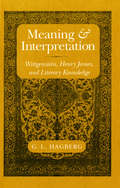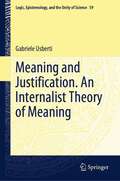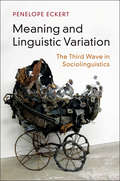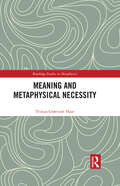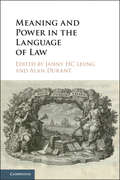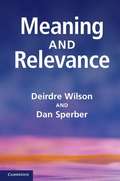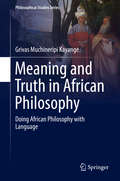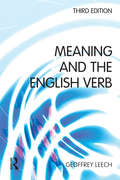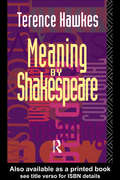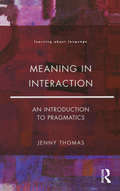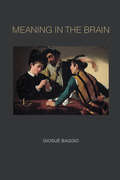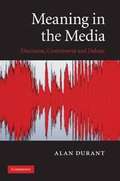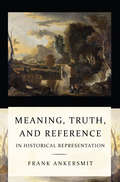- Table View
- List View
Meals in Early Judaism
by Susan Marks Hal TaussigThis is the first book about the meals of Early Judaism. As such it breaks important new ground in establishing the basis for understanding the centrality of meals in this pivotal period of Judaism and providing a framework of historical patterns and influences.
Mean Dads for a Better America: The Generous Rewards of an Old-Fashioned Childhood
by Tom ShillueAs a comedian and conservative thinker, whip-smart funny Tom Shillue grounds his ideas about our current culture and political climate in stories from his childhood — a portrait of growing up in 1970s America. Growing up as one of five kids in a devout Irish Catholic family in a small town outside of Boston, Tom sincerely believes that the rough-and-tumble, rules-dominated world in which he came of age was a better America—a time and place that made him into the well-adjusted, happy, successful man he is today. In Mean Dads for a Better America, Tom reminisces about his childhood, his family, and the traditional values he cherishes. He takes us back to a time when neighbors disciplined each other’s children without fear of being sued, when kids made it to the family table for dinner, when parents’ rules were gospel, when the occasional fistfight was considered a fair way to solve a problem, and when children were free to roam, make mistakes, and experience the first tastes of independence. Tom debates, debunks, and entertains with his hilarious approach to issues of the day, tackling the issues that confound many Americans, like our hypersensitive culture and overzealous parenting. As Tom celebrates the stability of family life and the sanity of days gone by, he encourages us to hold on to our sense of humor and look back at our own lives, as we work towards creating a better future for ourselves and our kids, all while making us laugh.
Mean Girl: Ayn Rand and the Culture of Greed (American Studies Now: Critical Histories of the Present #8)
by Lisa DugganAyn Rand’s complicated notoriety as popular writer, leader of a political and philosophical cult, reviled intellectual, and ostentatious public figure endured beyond her death in 1982. In the twenty-first century, she has been resurrected as a serious reference point for mainstream figures, especially those on the political right from Paul Ryan to Donald Trump. Mean Girlfollows Rand’s trail through the twentieth century from the Russian Revolution to the Cold War and traces her posthumous appeal and the influence of her novels via her cruel, surly, sexy heroes. Outlining the impact of Rand’s philosophy of selfishness, Mean Girlilluminates the Randian shape of our neoliberal, contemporary culture of greed and the dilemmas we face in our political present.
Meander, Spiral, Explode: Design and Pattern in Narrative
by Jane Alison"How lovely to discover a book on the craft of writing that is also fun to read . . . Alison asserts that the best stories follow patterns in nature, and by defining these new styles she offers writers the freedom to explore but with enough guidance to thrive." ―Maris Kreizman, VultureA Publishers Weekly Best Book of 2019 | A Poets & Writers Best Books for WritersAs Jane Alison writes in the introduction to her insightful and appealing book about the craft of writing: &“For centuries there&’s been one path through fiction we&’re most likely to travel― one we&’re actually told to follow―and that&’s the dramatic arc: a situation arises, grows tense, reaches a peak, subsides . . . But something that swells and tautens until climax, then collapses? Bit masculosexual, no? So many other patterns run through nature, tracing other deep motions in life. Why not draw on them, too?"W. G. Sebald&’s Emigrants was the first novel to show Alison how forward momentum can be created by way of pattern, rather than the traditional arc--or, in nature, wave. Other writers of nonlinear prose considered in her &“museum of specimens&” include Nicholson Baker, Anne Carson, Marguerite Duras, Gabriel García Márquez, Jamaica Kincaid, Clarice Lispector, Susan Minot, David Mitchell, Caryl Phillips, and Mary Robison.Meander, Spiral, Explode is a singular and brilliant elucidation of literary strategies that also brings high spirits and wit to its original conclusions. It is a liberating manifesto that says, Let&’s leave the outdated modes behind and, in thinking of new modes, bring feeling back to experimentation. It will appeal to serious readers and writers alike.
Meaning And Representation In History
by Jorn RusenHistory has always been more than just the past. It involves a relationship between past and present, perceived, on the one hand, as a temporal chain of events and, on the other, symbolically as an interpretation that gives meaning to these events through varying cultural orientations, charging it with norms and values, hopes and fears. And it is memory that links the present to the past and therefore has to be seen as the most fundamental procedure of the human mind that constitutes history: memory and historical thinking are the door of the human mind to experience. At the same time, it transforms the past into a meaningful and sense bearing part of the present and beyond. It is these complex interrelationships that are the focus of the contributors to this volume, among them such distinguished scholars as Paul Ricoeur, Johan Galtung, Eberhard Lämmert, and James E. Young. Full of profound insights into human society pat and present it is a book that not only historians but also philosophers and social scientists should engage with.
Meaning Generation in Chinese Official Media Discourse (Routledge Studies in Chinese Discourse Analysis)
by Rui Zhang Lutgard Lams Emma LupanoDrawing on approaches from Linguistic Pragmatics, Critical Discourse Analysis, Conceptual Metaphor Theory, Social Actor Representation Theory, and Framing Theory, this book critically explores the various linguistic devices and pragmatic strategies that concern meaning generation in the context of Chinese official media discourse.The volume rests on eight chapters that—using different analytical lenses, with either a culture-specific perspective or a cross-cultural one—take language analysis as their point of departure, in order to investigate how meaning is generated in situated discourse, such as media accounts about specific issues within the socio-political, cultural, or economic sphere. Each chapter is empirically grounded, and either focuses on a specific genre, such as the documentary and the press conference, or explores social and political events and initiatives that have been topical in recent years: the Covid-19 and SARS crises, the US-China trade conflict, the Regional Comprehensive Economic Partnership (RCEP), and the 2021 Hong Kong electoral system reform.By bringing back the linguistic analysis to the core of the analytical approach, the volume shows the interconnection of text and context, reminding the reader about the key role of language users both on the production and reception side.This book will be of interest to students and scholars interested in the relation between language and politics and, in particular, in understanding meaning-making and meaning-moulding processes in discourses articulated in an official Chinese context aimed both internally and internationally.
Meaning Is Everywhere: Language, Artificial Intelligence, Society
by Prashant ParikhMeaning Is Everywhere sketches a theory of meaning from the ground up—with potentially profound consequences. In a sweeping narrative that arcs from the origins of meaning through the emergence of present-day science and technology, Prashant Parikh offers a fresh perspective on some of the most significant challenges and opportunities of the contemporary world, including the promise of AI, relief from scarcity and polarization, and the possibility of at least partial utopias.
Meaning Making in Text
by Carys Jones Sonja Starc Arianna MaioraniMeaning Making in Text extends the notion of text as a vehicle for ever-changing and complex forms of communication. Based on recent developments in Systemic Functional Linguistics (SFL), it proposes a range of analytical tools for accessing a variety of discourses in different contexts. The book presents studies of linguistic and multimodal phenomena concerning English and minority European languages that, until now, have received very limited attention, and offers proposals for analysingtext in terms of their application to pedagogy. The contributors demonstrate the increasingly rich potential of SFL to provide a refreshingly powerful account of human nature and the ways it can be applied that go well beyond those to do with language itself.
Meaning Making: A Special Issue of Discourse Processes
by Timothy KoschmannThis special issue focuses on the difficult problem of how observers and researchers can make sense of how collaborating participants develop a shared understanding both of their task and their own participation in it. Or stated in another way, how can we derive meaning from their emergent and situated meaning making? Meaning making has been studied under a variety of names, and can be conceptualized on different levels of abstraction and from a variety of perspectives. The goal is to attempt to tease apart some of these views, while at the same time seeking means to bring them together in order to provide a more fully elaborated picture. This issue comes with a CD-ROM containing the brief video segment which all authors analyzed in the preparation of their contributions.
Meaning Of Meaning V 2: A Study Of The Influence Of Language Upon Thought And Of The Science Of Symbolism
by John ConstableFirst Published in 2001. Routledge is an imprint of Taylor & Francis, an informa company.
Meaning and Humour
by Andrew GoatlyHow are humorous meanings generated and interpreted? Understanding a joke involves knowledge of the language code (a matter mostly of semantics) and background knowledge necessary for making the inferences to get the joke (a matter of pragmatics). This book introduces and critiques a wide range of semantic and pragmatic theories in relation to humour, such as systemic functional linguistics, speech acts, politeness and relevance theory, emphasising not only conceptual but also interpersonal and textual meanings. Exploiting recent corpus-based research, it suggests that much humour can be accounted for by the overriding of lexical priming. Each chapter's discussion topics and suggestions for further reading encourage a critical approach to semantic and pragmatic theory. Written by an experienced lecturer on the linguistics of the English language, this is an entertaining and user-friendly textbook for advanced students of semantics, pragmatics and humour studies.
Meaning and Interpretation: Wittgenstein, Henry James, and Literary Knowledge
by G. L. Hagberg'What is the meaning of a word?' In this thought-provoking book, Hagberg demonstrates how this question—which initiated Wittgenstein's later work in the philosophy of language—is significant for our understanding not only of linguistic meaning but of the meaning of works of art and literature as well.
Meaning and Justification. An Internalist Theory of Meaning (Logic, Epistemology, and the Unity of Science #59)
by Gabriele UsbertiThis volume develops a theory of meaning and a semantics for both mathematical and empirical sentences inspired to Chomsky’s internalism, namely to a view of semantics as the study of the relations of language not with external reality but with internal, or mental, reality. In the first part a theoretical notion of justification for a sentence A is defined, by induction on the complexity of A; intuitively, justifications are conceived as cognitive states of a particular kind. The main source of inspiration for this part is Heyting’s explanation of the intuitionistic meaning of logical constants.In the second part the theory is applied to the solution of several foundational problems in the theory of meaning and epistemology, such as Frege’s puzzle, Mates’ puzzle about synonymy, the paradox of analysis, Kripke’s puzzle about belief, the de re/de dicto distinction, the specific/non-specific distinction, Gettier’s problems, the paradox of knowability, and the characterization of truth. On a more general philosophical level, throughout the book the author develops a tight critique of the neo-verificationism of Dummett, Prawitz and Martin-Löf, and defends a mentalist interpretation of intuitionism.
Meaning and Linguistic Variation: The Third Wave in Sociolinguistics
by Penelope EckertLinguistic styles particularly variations in pronunciation, carry a wide range of meaning - from speakers' socio-economic class to their mood or stance in the moment. This book examines the development of the study of sociolinguistic variation, from early demographic studies to a focus on the construction of social meaning in stylistic practice. It traces the development of the 'Third Wave' approach to sociolinguistic variation, uncovering the stylistic practices that underlie broad societal patterns of change. Eckert charts the development of her thinking and of the emergence of a theoretical community around the 'Third Wave' approach to social meaning. Featuring brand new material alongside earlier seminal work, it provides a coherent account of the social meaning of linguistic variation.
Meaning and Metaphysical Necessity (Routledge Studies in Metaphysics)
by Tristan Grøtvedt HazeThis book is about the idea that some true statements would have been true no matter how the world had turned out, while others could have been false. It develops and defends a version of the idea that we tell the difference between these two types of truths in part by reflecting on the meanings of words. It has often been thought that modal issues—issues about possibility and necessity—are related to issues about meaning. In this book, the author defends the view that the analysis of meaning is not just a preliminary to answering modal questions in philosophy; it is not merely that before we can find out whether something is possible, we need to get clear on what we are talking about. Rather, clarity about meaning often brings with it answers to modal questions. In service of this view, the author analyzes the notion of necessity and develops ideas about linguistic meaning, applying them to several puzzles and problems in philosophy of language. Meaning and Metaphysical Necessity will be of interest to scholars and advanced students working in metaphysics, philosophy of language, and philosophical logic.
Meaning and Power in the Language of Law
by Alan Durant Janny Hc LeungLegal practitioners, linguists, anthropologists, philosophers and others have all explored fundamental challenges presented by language in formulating, interpreting and applying laws. Building on centuries of interaction between legal practice and jurisprudence, the modern field of 'law and language', or 'forensic linguistics', brings insights in linguistics and related fields to bear on topics including legal drafting and translation, statutory interpretation, expert evidence on language use and dynamics of courtroom interaction. This volume presents an interlocking series of research studies engaged with different legal jurisdictions and socio-political contexts as well as with the more abstract notion of 'law'. Together the chapters, written by international leaders in their fields, highlight recent directions in research and investigate in particular how law expresses yet also conceals power relations in its crafted use of words and in the gaps and silence between those words.
Meaning and Relevance
by Deirdre Wilson Dan SperberWhen people speak, their words never fully encode what they mean, and the context is always compatible with a variety of interpretations. How can comprehension ever be achieved? Wilson and Sperber argue that comprehension is a process of inference guided by precise expectations of relevance. What are the relations between the linguistically encoded meanings studied in semantics and the thoughts that humans are capable of entertaining and conveying? How should we analyse literal meaning, approximations, metaphors and ironies? Is the ability to understand speakers' meanings rooted in a more general human ability to understand other minds? How do these abilities interact in evolution and in cognitive development? Meaning and Relevance sets out to answer these and other questions, enriching and updating relevance theory and exploring its implications for linguistics, philosophy, cognitive science and literary studies.
Meaning and Truth in African Philosophy: Doing African Philosophy with Language (Philosophical Studies Series #135)
by Grivas Muchineripi KayangeThis book offers a new way of doing African philosophy by building on an analysis of the way people talk. The author bases his investigation on the belief that traditional African philosophy is hidden in expressions used in ordinary language. As a result, he argues that people are engaging in a philosophical activity when they use expressions such as taboos, proverbs, idioms, riddles, and metaphors. The analysis investigates proverbs using the ordinary language approach and Speech Act theory. Next, the author looks at taboos using counterfactual logic, which studies the meaning of taboo expressions by departing from a consideration of their structure and use. He argues that the study of these figurative expressions using the counterfactual framework offers a particular understanding of African philosophy and belief systems. The study also investigates issues of meaning and rationality departing from a study on riddles, explores conceptual metaphors used in conceptualizing the notion of politics in modern African political thought, and examines language and marginalization of women and people with disabilities. The book differs from other works in African philosophy in the sense that it does not claim that Africans have a philosophy as is commonly done in most studies. Rather, it reflects and unfolds philosophical elements in ordinary language use. The book also builds African Conception of beauty and truth through the study of language.
Meaning and the English Verb
by Geoffrey N. LeechEvery language has its peculiar problems of meaning for the foreign learner. In the English language, some of the biggest yet most fascinating problems are concentrated in the area of the finite verb phrase: in particular, tense, aspect, mood and modality. Meaning and the English Verb describes these fields in detail for teachers and advanced students of English as a foreign or second language. This new third edition uses up-to-date examples to show differences and similarities between American and British english, reflecting a great deal of recent research in this area. It also takes account of the subtle changes which are taking place in the language today. In print for over 30 years, Meaning and the English Verb has established itself as a recognised authority on the meaning and use of verb constructions in English. This updated third edition will ensure that it remains an invaluable text for teachers and students of English worldwide.
Meaning by Shakespeare
by Terence HawkesWe traditionally assume that the `meaning' of each of Shakespeares plays is bequeathed to it by the Bard. It is as if, to the information which used to be given in theatrical programmes, `Cigarettes by Abdullah, Costumes by Motley, Music by Mendelssohn', we should add `Meaning by Shakespeare'. These essays rest on a different, almost opposite, principle. Developing the arguments of the same author's That Shakespearean Rag (1986), they put the case that Shakespeare's plays have no essential meanings, but function as resources which we use to generate meaning. A Midsummer Night's Dream, Measure for Measure, Coriolanus and King Lear, amongst other plays, are examined as concrete instances of the covert process whereby, in the twentieth century, Shakespeare doesn't mean: we mean by Shakespeare. Meaning by Shakespeare concludes with `Bardbiz', a review of recent critical approaches to Shakespeare, which initiated a long-running debate (1990-1991) when it first appeared in The London Review of Books.
Meaning in Interaction: An Introduction to Pragmatics (Learning about Language)
by Jenny A. ThomasMeaning in Interaction: An Introduction to Pragmatics is a comprehensive introductory text which discusses the development of pragmatics - its aims and methodology - and also introduces themes that are not generally covered in other texts.Jenny Thomas focuses on the dynamic nature of speaker meaning, considering the central roles of both speaker and hearer, and takes into account the social and psychological factors involved in the generation and interpretation of utterances. The book includes a detailed examination of the development of Pragmatics as a discipline, drawing attention to problems encountered in earlier work, and brings the reader up to date with recent discussion in the field. The book is written principally for students with no previous knowledge of pragmatics, and the basic concepts are covered in considerable detail. Theoretical and more complicated information is highlighted with examples that have been drawn from the media, fiction and real-life interaction, and makes the study more accessible to newcomers. It is an ideal introductory textbook for students of linguistics and for all who are interested in analysing problems in communication.
Meaning in the Brain (The\mit Press Ser.)
by Giosue BaggioAn argument that the meaning of written or auditory linguistic signals is not derived from the input but results from the brain's internal construction process.When we read a text or listen to speech, meaning seems to be given to us instantaneously, as if it were part of the input. In Meaning in the Brain, Giosuè Baggio explains that this is an illusion created by the tremendous speed at which sensory systems and systems for meaning and grammar operate in the brain. Meaning, Baggio argues, is not derived from input but results from the brain's internal construction process. With this book, Baggio offers the first integrated, multilevel theory of semantics in the brain, describing how meaning is generated during language comprehension, production, and acquisition. Baggio's theory draws on recent advances in formal semantics and pragmatics, including vector-space semantics, discourse representation theory, and signaling game theory. It is designed to explain a growing body of experimental results on semantic processing that have accumulated in the absence of a unifying theory since the introduction of electrophysiology and neuroimaging methods.Baggio argues that there is evidence for the existence of three semantic systems in the brain—relational semantics, interpretive semantics, and evolutionary semantics—and he discusses each in turn, developing neural theories of meaning for all three. Moreover, in the course of his argument, Baggio addresses several long-standing issues in the neuroscience of language, including the role of compositionality as a principle of meaning construction in the brain, the role of sensory-motor processes in language comprehension, and the neural and evolutionary links among meaning, consciousness, sociality, and action.
Meaning in the Media
by Alan DurantMeaning in the Media addresses the issue of how we should respond to competing claims about meaning put forward in confrontations between people or organisations in highly charged circumstances such as bitter public controversies and expensive legal disputes. Alan Durant draws attention to the pervasiveness and significance of such meaning-related disputes in the media, investigating how their 'meaning' dimension is best described and explained. Through his analysis of deception, distortion, bias, false advertising, offensiveness and other kinds of communicative behaviour that trigger interpretive disputes, Durant shows that we can understand both meaning and media better if we focus in new ways on moments in discourse when the apparently continuous flow of understanding and agreement breaks down. This lively and contemporary volume will be invaluable to students and teachers of linguistics, media studies, journalism and law.
Meaning, Discourse and Society
by Wolfgang TeubertMeaning, Discourse and Society investigates the construction of reality within discourse. When people talk about things such as language, the mind, globalisation or weeds, they are less discussing the outside world than objects they have created collaboratively by talking about them. Wolfgang Teubert shows that meaning cannot be found in mental concepts or neural activity, as implied by the cognitive sciences. He argues instead that meaning is negotiated and knowledge is created by symbolic interaction, thus taking language as a social, rather than a mental, phenomenon. Discourses, Teubert contends, can be viewed as collective minds, enabling the members of discourse communities to make sense of themselves and of the world around them. By taking an active stance in constructing the reality they share, people thus can take part in moulding the world in accordance with their perceived needs.
Meaning, Truth, And Reference In Historical Representation
by Frank AnkersmitIn this book, the noted intellectual historian Frank Ankersmit provides a systematic account of the problems of reference, truth, and meaning in historical writing. He works from the conviction that the historicist account of historical writing, associated primarily with Leopold von Ranke and Wilhelm von Humboldt, is essentially correct but that its original idealist and romanticist idiom needs to be translated into more modern terms. Rehabilitating historicism for the contemporary philosophy of history, he argues, "reveals the basic truths about the nature of the past itself, how we relate to it, and how we make sense of the past in historical writing. "At the heart of Ankersmit's project is a sharp distinction between interpretation and representation. The historical text, he holds, is first and foremost a representation of some part of the past, not an interpretation. The book's central chapters address the concept of historical representation from the perspectives of reference, truth, and meaning. Ankersmit then goes on to discuss the possible role of experience in the history writing, which leads directly to a consideration of subjectivity and ethics in the historian's practice. Ankersmit concludes with a chapter on political history, which he maintains is the "basis and condition of all other variants of historical writing. " Ankersmit's rehabilitation of historicism is a powerfully original and provocative contribution to the debate about the nature of historical writing.
